|
|
|
Sort Order |
|
|
|
Items / Page
|
|
|
|
|
|
|
| Srl | Item |
| 1 |
ID:
078965
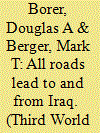

|
|
|
|
|
| Publication |
2007.
|
| Summary/Abstract |
This concluding article returns to some of the key themes of this volume in relation to insurgency, counter-insurgency and collapsing states. In particular it attempts to characterise the relationship between the Long War and the Cold War, in relation to the transformation of the nation-state system. More broadly it emphasises that the Cold War was an often misdirected, militarised struggle between 'genuinely existing' liberal capitalism and 'genuinely existing' state socialism (the First World and the Second World) against each other and for influence and power in the erstwhile Third World. The Long War, meanwhile, reflects both the triumph of 'genuinely existing' liberal capitalism as the dominant form of secular modernity over an equally, if not more virulently secular 'genuinely existing' state-socialism, and the emergence of an anti-secular neo-traditionalism (often, but not exclusively, Islamic) at both the nation-state and the transnational level. At the same time the binary that drove the Cold War and led to considerable bloodshed, was often characterised by contradictions within the two main ostensible challengers which were as potent as those between them. This is also the case in relation to Islamic revivalisms and their neo-traditional challenges to secular modernity and 'genuinely existing' liberal capitalism. (In fact, it is worth noting, that although Islamic fundamentalisms are at the forefront of the neo-traditional revival, there are other religious-based neo-traditionalisms seeking to counter the global spread of 'genuinely existing' liberal capitalism.) We conclude that the 'real' Long War may be a struggle within the 'Muslim world' rather than the ostensible struggle between the 'West' and 'Islam'
|
|
|
|
|
|
|
|
|
|
|
|
|
|
|
|
| 2 |
ID:
120428


|
|
|
|
|
| Publication |
2013.
|
| Summary/Abstract |
After 9/11 the United States has a significant disconnect between its strategic and tactical efforts against violent global jihadists. Some American leaders and commanders are confusing effectiveness and success, improperly associating tactical disruption of enemy elements with strategic effect. While the country has won some important tactical victories, it is not clear that they are amounting to a strategic impact, or that the gains will last. The situation is complex, with various dynamics influencing America's prosecution of the Long War and its ability to be successful in the long term. This article looks at what those factors are and provides policy makers with tangible recommendations that, if implemented, will place America's counterterrorism efforts on a more strategic trajectory and hold greater promise of lasting impact.
|
|
|
|
|
|
|
|
|
|
|
|
|
|
|
|
| 3 |
ID:
078956
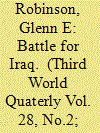

|
|
|
| 4 |
ID:
073373


|
|
|
| 5 |
ID:
078955


|
|
|
|
|
| Publication |
2007.
|
| Summary/Abstract |
In the late summer and autumn of 2003, facing increasingly violent opposition in both Afghanistan and Iraq, the USA implemented contrasting policies. In Afghanistan, it began to expand its footprint, creating Provincial Reconstruction Teams (prts) around the country. In Iraq, on the other hand, the US military withdrew from cities, garrisoning itself in armed camps. Despite the worsening situations in 2005 - 06, this paper argues that establishing prts in Afghanistan is a policy that should be repeated elsewhere, albeit with significantly more personnel deployed to a country. It is far more in line with counterinsurgency theory and US military doctrine, acting to win the support of the population. In Iraq, however, the more consolidated US bases helped to set the stage for the worsening situation and should not be allowed in future conflicts. Although they lessened the danger to US forces, they contradicted counterinsurgency policy and theory in other ways, creating vacuums of power into which guerrillas could enter. More broadly this trend is characteristic of a wider policy failure on the part of the USA and reflects the profound contradictions of Washington's approach to counterinsurgency both before and after 2003.
|
|
|
|
|
|
|
|
|
|
|
|
|
|
|
|
| 6 |
ID:
078954


|
|
|
|
|
| Publication |
2007.
|
| Summary/Abstract |
Is neo-trusteeship an appropriate response to the challenge of 'precarious statehood'? To the extent that contemporary trusteeship-like arrangements have been at all successful, it is questionable how much utility they may have beyond the few cases to which they have been applied. There are alternatives to neo-trusteeship, some of which employ similar principles (notably 'shared sovereignty'), but, like neo-trusteeship, they require a consensus between local and international actors to succeed. Their limitations notwithstanding, what may most recommend arrangements of this kind in future is simply that they can represent the least worst option, if not sometimes the best hope, for easing a territory's transition from war, injustice and dependence to peace, basic human rights and relative independence in the context of the changing international order of the post-cold war era
|
|
|
|
|
|
|
|
|
|
|
|
|
|
|
|
| 7 |
ID:
078953


|
|
|
|
|
| Publication |
2007.
|
| Summary/Abstract |
This article recounts the initial difficulties of the US occupation of Iraq that enabled the growth and maturation of the Iraqi insurgency. The focus will be on how the US military adapted, while in combat, to a situation for which its prior training and doctrinal focus had left it ill prepared. The article will explain the challenges faced by military leaders to move from a hierarchical, cold war-designed approach to warfare, to a more adaptive, decentralised mode of operations that requires distributed authority and decision making. The story will be told from the perspective of two strategic planners who helped shape the campaign plan for the coalition forces in Iraq, including the challenges they encountered when attempting to unify all elements of US national power against the Iraqi insurgency.
|
|
|
|
|
|
|
|
|
|
|
|
|
|
|
|
| 8 |
ID:
084603


|
|
|
| 9 |
ID:
072297


|
|
|
| 10 |
ID:
078963
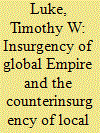

|
|
|
|
|
| Publication |
2007.
|
| Summary/Abstract |
This article examines the conflicts with Iraq, Afghanistan, Iran and Kuwait since 1978 in order to clarify how the modern state-form in the region is being undermined through aggressive efforts by US-led multinational coalitions to organise containment structures around Islamic, anti-Western powers, as well as around modernising petro-capitalist regimes, for the benefit of 'stability' in the larger world system. It asks if today's real insurgency is that of fluid Western multinational coalitions, while the true counterinsurgencies are the more fixed fundamentalist, localist and nationalist resistances in the region. It also asks whether weak civilian provisional authorities are displacing during the 21st century those older 19th century models of the strong state mapped out by Max Weber - both in the Middle East and elsewhere
|
|
|
|
|
|
|
|
|
|
|
|
|
|
|
|
| 11 |
ID:
074925
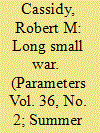

|
|
|
|
|
| Publication |
2006.
|
| Summary/Abstract |
The United States and its partners are prosecuting a protracted war against insurgents and terrorists who are animated by an ideology stemming from a radical fundamentalist interpretation of Islam. As of early 2006, the American national security bureaucracy began to use the appellation the "long war" in place of the Global War on Terrorism. At least one document describes this long war as the defining struggle of our generation, one that shifts emphasis from large-scale conventional military operations to small-scale counterinsurgency operations. The long war may last for decades.
|
|
|
|
|
|
|
|
|
|
|
|
|
|
|
|
| 12 |
ID:
078952


|
|
|
|
|
| Publication |
2007.
|
| Summary/Abstract |
This introductory article provides the context for the contemporary debate about insurgency, counterinsurgency and collapsing states taking place against the backdrop of what originated as the 'global war on terror' (gwot) and is now increasingly being characterised as 'the Long War'. The Long War and the gwot are often represented as a 'new' era in warfare and US geopolitics, despite the fact that, rhetorically, George W Bush and other administration officials have on occasion invoked the Second World War as analogous to the Long War. This article argues that the Long War is new in important respects, but it also bears many similarities to the Cold War. A key similarity between the Cold War and the Long War is the way in which insurgency and counterinsurgency are seen primarily in the context of inter-state rivalry in which the critical local or regional dynamics of revolution and counter-revolution are neglected. In this context US policy makers and their allies have again erroneously applied a 'grand strategy' that suits the imperatives of conventional military and geopolitical thinking rather than engaging with what is a much more variegated array of problems facing the changing global order. The Long War is ostensibly a war against various non-state movements, networks and actors, and is even represented as such by the Pentagon and the White House. However, the overall approach to the Long War has continued to fall back on the conventional 'American Way of War' that produces more problems than it solves.
|
|
|
|
|
|
|
|
|
|
|
|
|
|
|
|
| 13 |
ID:
099116
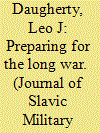

|
|
|
| 14 |
ID:
078959
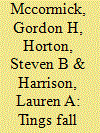

|
|
|
|
|
| Publication |
2007.
|
| Summary/Abstract |
Most internal wars end on the battlefield. Only a small percentage end at the negotiating table. While significant attention has been paid to how internal wars begin and how they evolve, relatively little attention has been paid to how they are concluded. What research has been done on this subject, furthermore, has focused almost exclusively on the problems that stand in the way of achieving a negotiated outcome, not on how these conflicts are so frequently resolved by force. This article examines the dynamics of the endgame struggle and the quite different ways in which states and insurgencies 'win' and 'lose' internal wars. We explore this topic theoretically and empirically in the first part of the article and examine the formal logic of the endgame in the second part, explaining how and why these endings follow a predictable pattern
|
|
|
|
|
|
|
|
|
|
|
|
|
|
|
|
| 15 |
ID:
083417


|
|
|
|
|
| Publication |
2007.
|
| Summary/Abstract |
The phrase "long war" is being used by the Bush officials to describe the intricacy and obduracy of America's ongoing struggle with the self-styled "global jihadists." Even though there are some similarities between this concept and the concept of "Cold War," the unique nature of the long war is making it difficult for the United States to develop an effective winning strategy. For the long war to conclude in America's favor, both Iraq and Afghanistan have to be stabilized and have effective governments, which should be perceived as legitimate by their respective citizens. Unless that happens, the United States will not be able to turn the tide of the long war in its favor.
|
|
|
|
|
|
|
|
|
|
|
|
|
|
|
|
| 16 |
ID:
075436


|
|
|
|
|
|
|
|